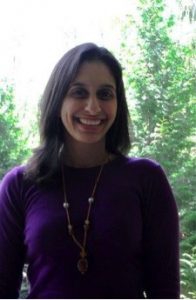Neeru Bakshi, MD
Psychiatrist

Dr. Neeru Bakshi is an expert in the field of adult, as well as adolescent psychiatry and is currently the Medical Director at the Eating Recovery Center of Washington. She is Board-Certified; a fellow of the American Psychiatric Association and a member of the International Association of Eating Disorder Professionals (IAEDP). Dr. Bakshi was formerly employed at Overlake Hospital and served as their Chairperson for the Department of Psychiatry at the Overlake Hospital Medical Center.
Dr. Bakshi also has experience in a multitude of areas including: consultation/liaison psychiatry, inpatient psychiatry, emergency psychiatry, outpatient psychiatry and partial hospitalization psychiatry.
Read on for our interview with Dr. Bakshi!
Dr. Bakshi, what made you want to become a psychiatrist?
NB: I decided to become a psychiatrist when I was in medical school during my 3rd year rotation in psychiatry. I worked at a variety of levels of care and types of facilities, and I was intrigued by the fact that I experienced something different with each patient I saw and each story I heard. That dynamic nature of the field intrigued me and helped lead me to choose psychiatry as my profession. I also worked with a mentor during my rotation who treated patients with eating disorders. Seeing that side of medicine really resonated with me and what I was looking to do, so I decided to specialize in eating disorders and I haven’t looked back since.
Will you share with us a bit about your educational journey?
NB: I attended George Washington University where I received a Bachelor’s of Science in Biology. After that, I continued my schooling and earned my medical degree from Texas A&M University Health Sciences Center College of Medicine. I completed my internship and residency at Baylor College of Medicine in the Menninger Department of Psychiatry and Behavioral Sciences and the University of Washington. I then stayed in Washington as I began my career, ultimately working at Overlake Hospital and as Chairperson of the Department of Psychiatry at Overlake Hospital Medical Center. I started working at Eating Recovery Center of Washington after that and am now Medical Director there.
What were the greatest challenges for you educationally?
NB: Despite the rigorous schooling that comes with working in psychiatry, the greatest challenge for me has been accepting that I cannot know everything. I have tried over the years to learn as much as I can, but I know that there is no way that I can know the answer to every question that is asked. However, as I grow in the field, I enjoy that there is always more to learn and that there is always an opportunity to learn and improve no matter how much you think you know.
What advice would you give someone who wanted to follow in your footsteps?
NB: The fields of medicine and psychiatry are dynamic and ever changing, so be prepared to continue to learn for the life of your career. I would also recommend seeking out a mentor early in your education who can expose you to different specialties and career directions. I am thankful that I was able to find someone to help me make early career decisions and ultimately decide what aligned best with my personal passions. Also, I would like to advise those starting out in this profession to not stress about finding your exact niche in the industry. Go into every experience with an open mind you will find that you may end up loving something that you had not otherwise considered.
What is special or rewarding about working in your field?
NB: At Eating Recovery Center of Washington, I get to see patients who are very ill transition to wellness, and being a small part of that journey is the most rewarding. It is also special to have a job where I welcome the challenge that every day brings, especially knowing that I could help someone change their life for the better. To be a part of the recovery process is a special responsibility that makes it easy to get up for work every morning.
What one thing do you hope to have accomplished by the end of your career?
NB: I want to look back and know that I have been helpful to the patients that I see. I want to have made a difference in some way in as many lives as possible. Even if the patient isn’t in full recovery for the rest of their lives, I want to have made some positive impression. If I can do that, then I would consider it a successful career.
Is there anything else you'd like to share?
NB: I would encourage anyone entering this field to keep an open mind and see as many sides of the industry as possible. I first started in general psychiatry, and through a series of events was exposed to working with patients with eating disorders. I’m so glad that I have now made eating disorder work my primary focus and have the opportunity to help patients at Eating Recovery Center of Washington on their roads to recovery.
We’d like to extend our greatest appreciation to Dr. Bakshi for her excellent advice. Learn more about careers in psychiatry.








